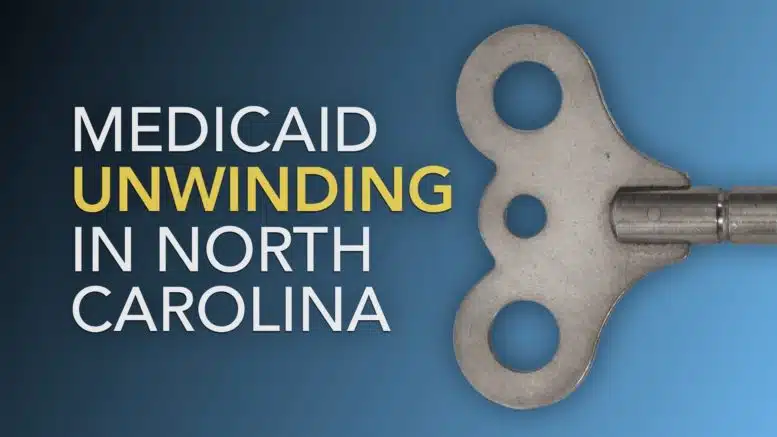By Jaymie Baxley
When Medicaid expansion was signed into law earlier this year by Gov. Roy Cooper, it was widely heralded as a transformative event for uninsured people in North Carolina.
Amid the bipartisan celebration, there was little mention of the hundreds of thousands of existing enrollees who are expected to lose Medicaid coverage before expansion goes into effect. Few of the revelers acknowledged the less-than-ideal timing of the legislation, which passed just days before the expiration of a federal mandate that had prevented states from kicking Medicaid beneficiaries who became eligible for coverage during the COVID-19 pandemic off of the rolls.
Known as the continuous coverage requirement, the three-year-long mandate ended on April 1, the same week expansion became law. The so-called unwinding of this continuous coverage rule means the state must redetermine the eligibility of more than 2.9 million people who are currently receiving Medicaid. It’s an unprecedented undertaking that some health care advocates fear will trigger a wave of unwarranted terminations.
Before the pandemic, Medicaid recipients usually experienced an annual or semiannual review to verify that they continued to qualify for coverage. But many of the state’s more recent enrollees, who gained coverage during the public health emergency, have never gone through the process. Statewide enrollment grew 36 percent during the pandemic, with over 797,000 people newly qualifying for coverage from March 2020 until April of this year.
The N.C. Department of Health and Human Services estimates that as many as 300,000 individuals could lose coverage in connection with the unwinding. In a statement to NC Health News, the agency said its “goal is to ensure people eligible for Medicaid do not lose coverage and those no longer eligible are transitioned smoothly to affordable health plans.”
DHHS confirmed that many individuals who lose Medicaid in the coming months will become eligible again after expansion is implemented. The issue is timing: Terminations are scheduled to begin in July. And expansion won’t officially begin until a state budget is approved, leaving an untold number of North Carolinians with a monthslong gap in coverage. (The budget for fiscal 2021-23 was not approved until mid-December 2021.)
“There’s going to be a lot of people falling through the cracks, even in the best of situations,” said David Anderson, a researcher at Duke University’s Margolis Center for Health Policy. “And since we’re going to have a gap between when redetermination starts and when expansion starts, it’s not the best situation.”
Eligible but still at risk
Eligibility for Medicaid in North Carolina is based on an individual’s circumstances and income.
Expansion will raise the income limit to 138 percent of the federal poverty level, allowing a single mother with two young children to earn as much as $34,300 a year and still qualify. If that same mother currently makes $25,000 a year, or about $12 an hour, her coverage could be discontinued during the unwinding.
Jessica Andrews, a military veteran who lives in the Sandhills, is a single mother with two young children enrolled in Medicaid.
Andrews uses her VA benefits to cover her own medical needs, but she said Medicaid has allowed her children to receive important treatments and procedures they might have otherwise gone without. The program recently paid for her youngest child’s tonsil-removal surgery.
“It basically covers anything that they would need,” she said. “As a single mom on a single income, I wouldn’t be able to afford it.”
Single parents making slightly more money than they did before the pandemic aren’t the only ones at risk. Parents and caregivers of children who turned 18 while the continuous coverage mandate was in place could also be kicked off the rolls. So could beneficiaries with disabilities who picked up part-time jobs or who began receiving Social Security benefits that put their annual income over the federal poverty limit.
Even enrollees who continue to meet the criteria for Medicaid are at risk of losing coverage.
North Carolina’s unwinding plan calls for an “ex parte” approach to redetermination, meaning most cases are expected to be reviewed automatically “without any contact with the beneficiary,” using information culled from wage databases and other sources. In some cases, the state may not have all the data needed to automatically determine a person’s ongoing eligibility.
When that happens, a local or county Department of Social Services will send a letter asking for the missing information. If the recipient fails to respond within 30 days, they could be subject to what caseworkers call “procedural disenrollment.”
“Procedural disenrollments are one of our biggest concerns with the unwinding because those are likely [to] affect people who should still be eligible for coverage but are disenrolled due to some kind of administrative reason,” Allie Gardner, a senior research associate at the Georgetown University McCourt School of Public Policy’s Center for Children and Families, said during a recent webinar for health care professionals.
She added, “There are a number of reasons why these procedural disenrollments can occur.” For example, a person may never receive a notice from their local DSS office because the agency does not have their current mailing address. Or maybe the DSS worker who mailed the notice put down the wrong address. Or maybe it just got lost in the mail.
It is also possible, Gardner said, that a person simply “may not understand their renewal notice or that there is action required in order to maintain coverage.”
“For people who are non-English speakers, they may not receive their notice in their preferred language and therefore may not be able to understand the information to respond in the prompt manner that’s required,” she said.
The federal Office of the Assistant Secretary for Planning and Evaluation, the chief advisory group to the U.S. Department of Health and Human Services, has predicted that nearly 8 percent of the nation’s Medicaid enrollees, or about 6.8 million people, will lose coverage during the unwinding — despite remaining eligible for Medicaid.
Terminations are not scheduled to begin in North Carolina until July, but some states that are further along in the unwinding are reporting worryingly high rates of procedural disenrollments. In Arkansas, for example, about 88.5 percent of unwinding-related terminations have been attributed to procedural issues.
“Our Medicaid population, as a class, is either very old, very sick, or very poor or kids,” Anderson said. “It’s a population that historically, when they’re faced with the substantial compliance cost of filling out paperwork correctly, there’s going to be errors.”
Precautions and protections
North Carolina officials say they have taken steps to minimize the potential toll of the unwinding.
One measure is spreading redeterminations out over a 12-month period instead of prioritizing specific populations for review. The state is scheduling cases “based on the beneficiary’s existing renewal date,” which means a number of expansion-eligible beneficiaries could avoid experiencing a gap in coverage if their renewal date occurs after expansion is implemented.
“We are pleased that the state has made some efforts to slow our redetermination by trying to line it up so that it’s closer to whenever we get expansion done,” said Abby Emanuelson, executive director of the advocacy group Care4Carolina. “I think we all ideally would have hoped for the timing to be more aligned with expansion, but we’re happy that they’ve developed more of a soft landing.”
She went on to compare North Carolina’s approach with the current situation in South Dakota, another state that recently adopted Medicaid expansion. Many South Dakotans who lost coverage in April are expected to re-enroll when their state’s expansion takes effect in July.
According to DHHS, local and county DSS offices have also “continued to perform redeterminations but not terminate people from coverage” since September 2020. The agency said many other states “stopped these actions and are starting the process for the first time in three years.”
While that practice run should help the unwinding move more efficiently in North Carolina, it doesn’t guarantee the process will be entirely free of issues. Cassidy Estes-Rogers, program director for family support and health care at the Charlotte Center for Legal Advocacy, noted that there were “no consequences” for any of the redeterminations that were done while the continuous coverage mandate was in effect.
“If they couldn’t complete them, they just didn’t,” she said. “But now people’s benefits are actually on the line.”
Before the pandemic, the Charlotte Center for Legal Advocacy center was part of a class action lawsuit that sought to prevent North Carolina from illegally terminating residents’ coverage. A settlement reached this past October requires the state to send out notices informing Medicaid recipients of their rights during the unwinding.
Sign up for our Newsletter
Among other rights, individuals who believe their coverage was wrongfully terminated have up to 60 days to appeal the decision. If a person remains eligible for Medicaid, but their coverage was terminated because they failed to respond to a request for information or never received the request, their benefits should be reinstated if they provide the information to their local or county DSS office within 90 days.
“Part of what we’re doing is just educating people about how this works and the rights that they have,” Estes-Rogers said. “And then the other part of it is monitoring and making sure that we hold the state and the county DSS’s accountable to following the procedures that are in place.”
Andrews, the mom from the Sandhills region, first learned about the unwinding from a reporter for NC Health News.
“I haven’t heard anything about that yet,” she said in an interview on Friday. “I haven’t received anything in the mail either.”
She isn’t alone. A recent survey by KFF, formerly known as Kaiser Family Foundation, found that 65 percent of respondents said they did not know that their states would be allowed to remove people from Medicaid at the end of the pandemic emergency period.
The state hopes to enlist health care providers, advocates and other stakeholders to help spread the word about the unwinding. In February, DHHS published a toolkit with “ready-to-use messages” for community partners to share on social media and in emails and text messages to individuals who may be up for redetermination.
Many of the messages, written in both English and Spanish, urge enrollees to make sure their local or county DSS has their current contact information on file. The messages also encourage enrollees to sign up for ePASS, the state’s online portal for Medicaid beneficiaries.
Still, the pending Medicaid expansion presents a unique public relations challenge for the state, which is simultaneously conducting “outreach to those who may possibly become eligible for coverage,” according to DHHS’ statement to NC Health News.
“It would be ideal if the state were able to implement expansion before anyone is terminated and then be able to consider all of the current members under the new category,” Estes-Rogers said. “But unfortunately, the expansion category doesn’t technically exist at this time.”










